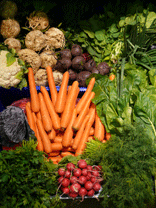Post Yom-Tov Crisis: Tips for Losing those Extra Kilos
Post Yom-Tov Crisis: Tips for Losing those Extra Kilos
The Yom Tov season is a time for taking inventory of our lives, and accepting upon ourselves various decisions regarding the coming year. It is safe to assume that by the end of Yom-Tov you are also left with several extra kilos, which likewise require your attention. Michal Gil’on, clinical dietician, presents you with invaluable tips related to diets and weight-loss:
Most diets will offer an average weight-loss goal of 5-10%, but many people wish to lose twice or three times this amount within the same time-frame. Exaggerated expectations and a mindset that focuses only on the short-term benefits, cause people to chase after elusive ‘magic’ methods to speedy slimming. These solutions often make the overall situation worse. An average weight loss of about half a kilo a week sounds perhaps too little, but calculated annually it amounts to an impressive 25 kilos in all.
It is worthwhile to stage your goals in a progressive manner, deciding on one goal at a time and focusing on attaining that. With time, as your routine absorbs these changes and they become a fixed part of your life, you may add another goal.
For example, there is no point in deciding to take up vigorous walking each day for an hour, when it is clear that you won’t be able to stick to this for more than a week. It is preferable to begin with walking half an hour twice a week, and to increase on that progressively as your timetable allows.
Breakfast: the most essential meal of the day
Eating a wholesome breakfast improves concentration and strengthens the mind’s problem solving capabilities – not just for children in school but also for adults at work. Contrary to popular opinion, breakfast does not ‘invite the appetite’ for the rest of the day, but prevents sharp hunger pangs setting in and thereby diminishes the risk of uncontrolled snacking
throughout the day. People who eat breakfast consume fewer calories in their day, making it easier for them to lose weight. An additional health benefit derived from eating a nutritious breakfast is the positive effects on the heart: those who eat a full breakfast rich in whole grains, boast lower levels of cholesterol and insulin in their blood.
It is highly recommended to partake of a morning meal consisting of complex carbohydrates, proteins and healthy fats. For example: cereal with milk, a sandwich with cheese and avocado, yoghurt with granola, fruit shakes such as banana in milk, porridge with milk and many other varied possibilities and combinations.
Eat at least 3 portions of dairy products a day: research has shown that people with a higher proportion of dairy and calcium in their diet have a lower body weight than others
The consumption of at least 3 portions of low-fat dairy products as part of a nutritious, low calorie diet, assists greatly in the goal of weight loss, fat reduction and the maintaining of your new weight on a long term basis. The assumption is that the unique combination of calcium with the other nutritional components found in milk, causes the body’s metabolism to accelerate and thereby improves its ability to burn calories.
Aside from the weight-loss aspect, there are other healthful benefits of a dairy-rich diet: it can help lower the risks of various ailments such as osteoporosis, high blood pressure, heart disease, Type 2 diabetes… amongst many others.
Portions that contain around 200 mg of calcium include – a cup of milk, a tub of yoghurt, a cup of white cheese or cottage cheese, 5 cubes (50 grams) of Safed cheese or salted cheese.

Begin each meal with a salad or soup: Eating low-calorie but filling foods such as salads and vegetable soups, increases feelings of satiation and thereby lowers the amount of calories you will consume in the meal.
It is recommended to eat 5 portions of vegetables and fruit every day (a portion = up to 100 grams), of all types and colors so as to benefit form the abundance of vitamins and minerals available within. It is best to eat them with the peel, so that you won’t lose some of the nutritious vitamins and dietary fibers.
To decrease or refrain from sweet drinks
This is one of the simplest ways to cut down a substantial portion of your daily caloric intake, because in each cup of sweet drink there are roughly 100 calories.
Get sufficient sleep: lack of sleep leads to tiredness and lethargy during the day, hinders concentration and ability to function – and affects weight loss
Sleep is known to affect body weight and a marked lack of sleep can interfere with the body’s ability to lose weight. When you don’t receive an adequate night’s sleep, changes occur in your body that affect the levels of hormones related to hunger and satiation. This in turn causes a significant increase in feelings of hunger and apetite, which you will find are directed particularly towards high calorie foods.








